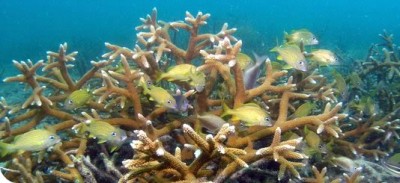NSU Newsroom
SharkBytes
Horizons
This version of NSU News has been archived as of February 28, 2019. To search through archived articles, visit nova.edu/search. To access the new version of NSU News, visit news.nova.edu.
This version of SharkBytes has been archived as of February 28, 2019. To search through archived articles, visit nova.edu/search. To access the new version of SharkBytes, visit sharkbytes.nova.edu.
NSU Research Spotlight: Coral Reef Ecosystems
 Scientists are asked frequently asked about which coral reefs are important in terms of biodiversity — the number of species that inhabit them. NSU Oceanographic Center professor James Darwin Thomas, Ph.D., is investigating small species of crustaceans that tell the evolutionary history of how biodiversity is assembled and maintained in coral reef ecosystems. He led a team of scientists to investigate the Madang Lagoon off Papua New Guinea’s north coast. This small lagoon is the most diverse reef system ever documented and is in danger from impact caused by mankind. Thomas’ research mission is timely because a multinational mining corporation has received permission to dump thousands of tons of mining waste in a river that drains into the lagoon. Thomas and his team of scientists will document certain groups of indicator species, or model organisms, in the lagoon before the mining operation commences. Any adverse impacts from mining can then be measured. The results of the expedition revealed that not only has the level of biodiversity been sustained, taxonomists also added a number of new species not previously recorded. These efforts demonstrate the importance of periodic detailed studies of coral reef diversity in providing a scientific benchmark against which further change can be assessed and monitored.
Scientists are asked frequently asked about which coral reefs are important in terms of biodiversity — the number of species that inhabit them. NSU Oceanographic Center professor James Darwin Thomas, Ph.D., is investigating small species of crustaceans that tell the evolutionary history of how biodiversity is assembled and maintained in coral reef ecosystems. He led a team of scientists to investigate the Madang Lagoon off Papua New Guinea’s north coast. This small lagoon is the most diverse reef system ever documented and is in danger from impact caused by mankind. Thomas’ research mission is timely because a multinational mining corporation has received permission to dump thousands of tons of mining waste in a river that drains into the lagoon. Thomas and his team of scientists will document certain groups of indicator species, or model organisms, in the lagoon before the mining operation commences. Any adverse impacts from mining can then be measured. The results of the expedition revealed that not only has the level of biodiversity been sustained, taxonomists also added a number of new species not previously recorded. These efforts demonstrate the importance of periodic detailed studies of coral reef diversity in providing a scientific benchmark against which further change can be assessed and monitored.